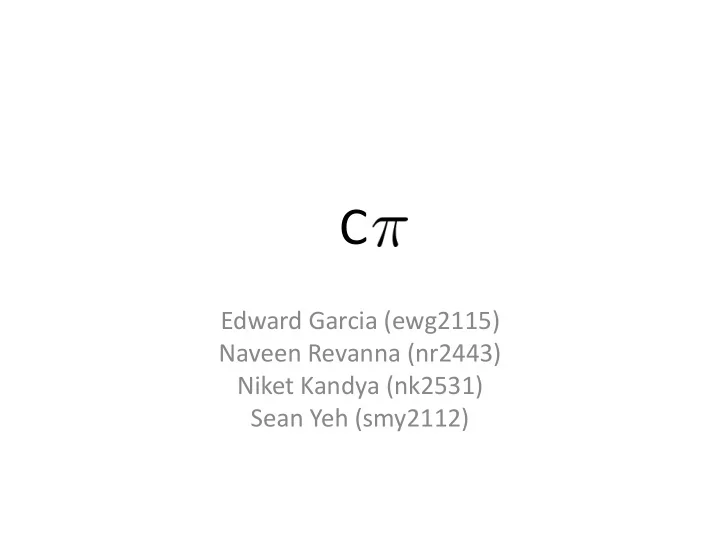

C Edward Garcia (ewg2115) Naveen Revanna (nr2443) Niket Kandya (nk2531) Sean Yeh (smy2112)
Introduction ARM V6 Assembly Subset of C
Supported Features Control/looping: Types: Functions: Operators: int if malloc + - * / else char free < <= == > >= while printf void && || struct for scanf return pointer (to anything, unlimited levels) array Most of your favorite features from C...
Unsupported Features • double, float types • floating point operations • short and long integers • Unsigned, signedintegers • break, continue • Enums • Sizeof() • Increment, decrement operators. • do-while and switch statements. • auto, register, volatile static and extern. • Multi-file compilation and linkage. • Preprocessing - no # directives. • Function pointers. • Function inlining. • Static and volatile function. • Variable function arguments - Ellipsis (...) • Typecasting
Scoping • Global definition of structs • Variable Scope Limited to function • Static Scoping • Variable Declarations at beginning of functions • Struct Declarations at beginning of functions • Variable, struct and array assignment following declarations
Architecture Program.cpi Parser AST Scanner Arm Program.s SAST Bytecode Assembly Cpi GCC Executable
Parser / Ast Function Declarations - Statement List Ast - Variable Declarations - Return types - Function args - Function name Parser and Program Scanner Structure Declaration - Structure name - Member Variables
Creating the SAST Each Function Struct Index -struct name Function -member variable Declarations name/type - Function args - Variable Declarations - Return types - Statement List Local Index - Function name -variable name SAST -variable types Structure Declaration Function Index -Function names - Structure name -Args - Member Variables -Return Type
Creating the SAST Function Struct Local Index Index Index Function Ex() Statement Block while (i < k.c) = < a + 1 b('4', 27) i k.c
Creating the SAST Function Struct Local Index Index Index Function Ex() Statement Block while (i < k.c) = variable/function exist? variable/function duplicate? < a + 1 b('4', 27) i k.c
Creating the SAST Function Struct Local Index Index Index Function Ex() Statement Block while (i < k.c) = Assign types to leaves < int + 1 int char int
Creating the SAST Function Struct Local Index Index Index Function Ex() Statement Block while (int) int Assign types to rest of expressions int int int 1 int char int
Type Checking • While conditions • If conditions • Variable assignments • Function arguments • Binary Operations • Return type checking • Pointer Arithmetic • Array Index Checking • Pointer Assignments • Structs Dereferencing
SP & FP FP SP Variable Symbol Table int a; a char b; b char c; c char d[2]; varname type offset d int e[2]; a [Int] 4 char *f; int g[a]; (a=2) b [Char] 5 c [Char] 6 e [Arr(2);Char] d 8 [Arr(2);Int] e 16 f [Ptr;Char] f 20 SP g g [Ptr;Int] 24 SP
Structure Symbol Table int a; char b; char c; char d[2]; varname type offset int e[2]; a [Int] 0 char *f; f b [Char] 5 c [Char] [Arr(2);Char] d 8 e [Arr(2);Int] e 16 [Ptr;Char] d f 20 c b g [Ptr;Int] 24 a
Bytecode Generation Per Function Per Function Indexes Bytecode List Bytecode Generation AST and Type Information -Stack Offset Information for variables -Label names -Values -Constants
Bytecode
The challenges • Array offset calculation – arr[a+b+2] • Pointer arithmetic – *(p+2) – *(2+a+p) • Structure member offsets – s.a – s.a.c[3] – s->b • All reduce to (base + offset) bytecode
arr[a+b+2] – BinEval(t1,a,+,b) – BinEval(t2,t1,+,2) – BinEval(t3,t2,*,4) – BinEval(t4,Addr(arr),+,t3) – Pntr(t4)
*(2+a+p) • BinRes(Int); – BinEval(t1,2,+,a) • BinRes(Ptr;Int) – BinEval(t2,t1,*,4) – BinEval(t3,p,+,t2) • BinRes(Int) – Pntr(t3)
Arm Assembly Generation Per Function Assembly File Bytecode List ARM -Variable Addresses -Register Allocations Assembly -Label address -Constants addresses -Stack Offset Information for variables -Label names -Values
Cpi -> Bytecode -> Arm
Testing 161 Tests -64 Type Checking Tests -97 Feature Tests Test Enviornment -SSH and Raspberry Pi Server -QEMU Emulation
Example: Tic-Tac-Toe - 2 Player game - Features array passing and printf/scanf
Example: Linked List - Function passing of structs and pointers - Memory allocation with malloc/free
Example: Brainfuck Interpreter Compiling an interpreter?? Yes! - runbf.sh is used to pass the source code of the bf program along with its length to the bf interpreter - bf reads the two command line arguments through scanf
Project Management
Project Timeline Test Pointers SAST Hello World structs Scanner Framework Tests Parser while Bytecode Bug Fix return ARM Binops if feature Generation Offset Calc Rework tests
Contributions • Naveen Revanna - Architecture Czar, Bytecode Generation • Eddy Garcia - Type Checking, Test Case Generation, External functions • Sean Yeh - Test suite, Example programs, bug fixes • Niket Kandya - Scanner/Parser, Scalar Types and Functions, Design
Lessons Learned • Naveen Revanna - Spend sufficient time in deciding a scalable architecture at early stages. Don't trust your developer self. Document code sufficiently. A good test infrastructure can save you loads of time. • Eddy Garcia - Pattern matching should be a feature available in all languages. Regression tests are wonderful. • Sean Yeh - Next time I will not write test suite script in BASH. Nevertheless, the testing framework turned out pretty well. • Niket Kandya - Time spent on good design is time saved. Functional Programming is a clean approach. Compilers are fun.
Recommend
More recommend